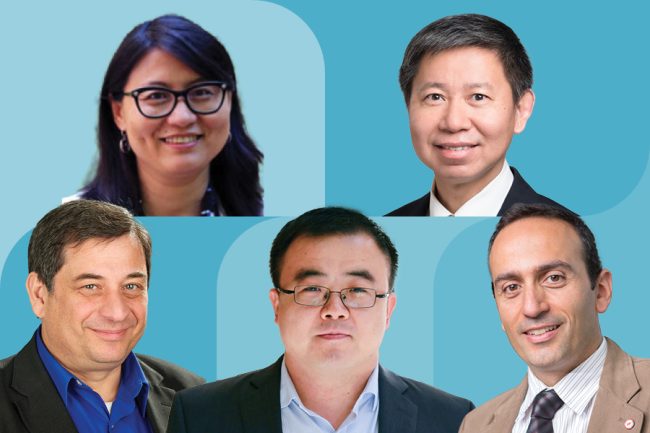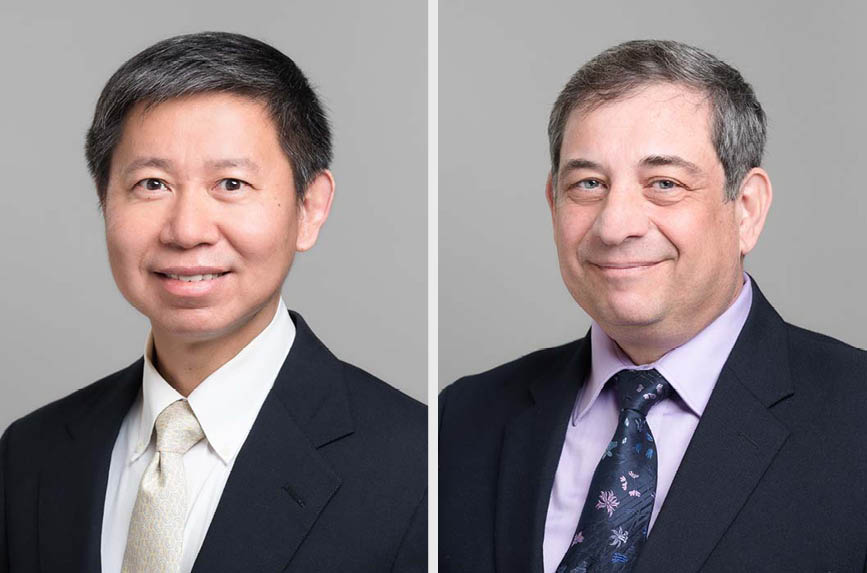
JUNE 7, 2023 • By Carolyn Farrell
Eleven members of the U of T Engineering community have been elected as 2023 fellows of the Canadian Academy of Engineering (CAE). Professors Ali Dolatabadi (MIE), George Eleftheriades (ECE), Baochun Li (ECE), Xinyu Liu (MIE) and Ning Yan (ChemE), along with alumni Janet Elliott (EngSci 9T0, MechE MASc 9T2, PhD 9T7), Mina Hoorfar (MechE MASc 0T1, PhD 0T5), Steve Hranilovic (ElecE MASc 9T9, PhD 0T3), Mark Martinez (ElecE 8T7, MASc 9T0), Carolyn Ren (MechE PhD 0T4) and David Tennenhouse (ElecE 7T7, MASc 8T1), are among the CAE’s 55 new fellows. The CAE is a national institution through which individuals who have made outstanding contributions to engineering in Canada provide strategic advice on matters of critical importance to Canada and to Canadians.
“The election of these exceptional faculty and alumni to the Academy is an important recognition of their impact as engineering innovators, educators and leaders, both nationally and globally,” says U of T Engineering Dean Christopher Yip. “On behalf of the Faculty, congratulations to all our new CAE fellows.”
“The Canadian Academy of Engineering has made an excellent choice in electing Professors George Eleftheriades and Baochun Li as fellows in its 2023 cohort,” says Professor Deepa Kundur, Chair of ECE. “Each has shown incredible dedication to the department and his students while establishing an international reputation for stellar research. Congratulations to George, Baochun and all the newly elected fellows.”

Baochun Li is a pioneering researcher and innovator in multimedia systems, networking, cloud computing and distributed systems. A Bell Canada Endowed Chair since 2005, he has worked closely with industry partners such as Bell Canada and Microsoft and has published many influential papers, garnering more than 24,000 citations and an h-index of 86. Li led the creation of R2, the world’s first large-scale peer-to-peer video streaming system using network coding; R2’s technology was the first deployment of network coding in commercial video broadcasting. Li is also a leader in application-layer network protocols, which are technologies used to speed up the delivery of large volumes of data across cloud datacentres and the Internet. In response to the COVID-19 pandemic, he recently launched one of the first dedicated online conferencing platforms. Li is a fellow of IEEE and has received several prestigious awards for his contributions.
George Eleftheriades is a pioneer in the field of metamaterials, which are artificial electromagnetic materials that can bend waves and process light in unnatural ways. The applications for these materials are immense and include sub-wavelength imaging in advanced medical diagnostics, very small and efficient antennas, wireless power transfer, efficient solar light harvesting, and even cloaking, where waves are bent around an object in a way that renders them transparent. Eleftheriades has become a world leader in this area by marrying fundamental physics and engineering to demonstrate the potential of this technology and then using it to invent novel devices for wireless communications, radar, super-resolution imaging and in the defence sector. Eleftheriades is a fellow of the Institute of Electrical and Electronics Engineers (IEEE) and the Royal Society of Canada, and has received many of the most prestigious national and international awards in his field.
See story from U of T Engineering News for all elected fellows; with files from Matthew Tierney


